Policy and Planning for Sustainable Development
VerifiedAdded on 2023/06/11
|14
|3002
|289
AI Summary
The report deals with the development of the sustainability policy in the context of Travelodge Hotel. It includes recycling and energy conservation initiatives to reduce their carbon footprint from the environment. Stakeholder engagement is crucial for successful implementation. The policy aims to achieve economic sustainability besides the environmental sustainability.
Contribute Materials
Your contribution can guide someone’s learning journey. Share your
documents today.
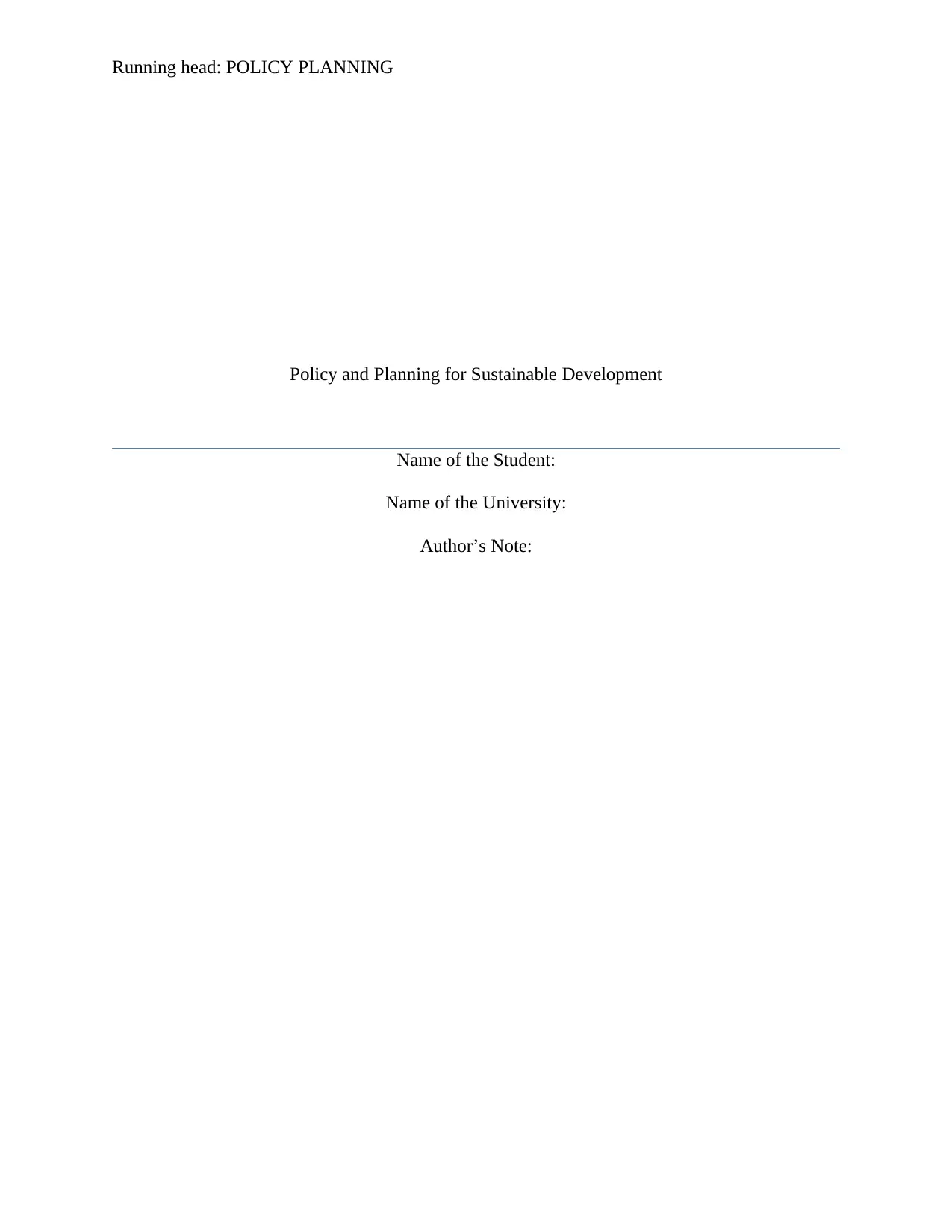
Running head: POLICY PLANNING
Policy and Planning for Sustainable Development
Name of the Student:
Name of the University:
Author’s Note:
Policy and Planning for Sustainable Development
Name of the Student:
Name of the University:
Author’s Note:
Secure Best Marks with AI Grader
Need help grading? Try our AI Grader for instant feedback on your assignments.
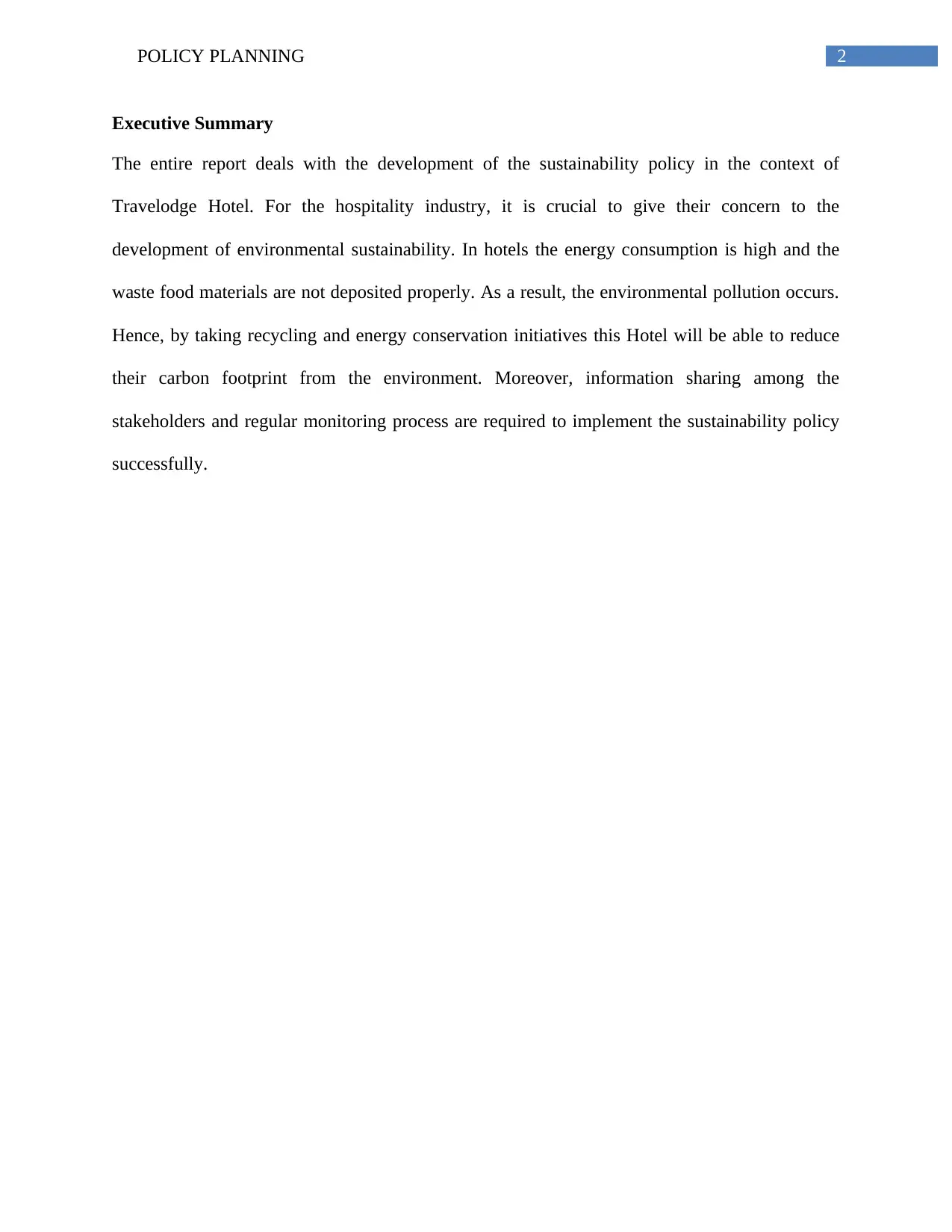
2POLICY PLANNING
Executive Summary
The entire report deals with the development of the sustainability policy in the context of
Travelodge Hotel. For the hospitality industry, it is crucial to give their concern to the
development of environmental sustainability. In hotels the energy consumption is high and the
waste food materials are not deposited properly. As a result, the environmental pollution occurs.
Hence, by taking recycling and energy conservation initiatives this Hotel will be able to reduce
their carbon footprint from the environment. Moreover, information sharing among the
stakeholders and regular monitoring process are required to implement the sustainability policy
successfully.
Executive Summary
The entire report deals with the development of the sustainability policy in the context of
Travelodge Hotel. For the hospitality industry, it is crucial to give their concern to the
development of environmental sustainability. In hotels the energy consumption is high and the
waste food materials are not deposited properly. As a result, the environmental pollution occurs.
Hence, by taking recycling and energy conservation initiatives this Hotel will be able to reduce
their carbon footprint from the environment. Moreover, information sharing among the
stakeholders and regular monitoring process are required to implement the sustainability policy
successfully.
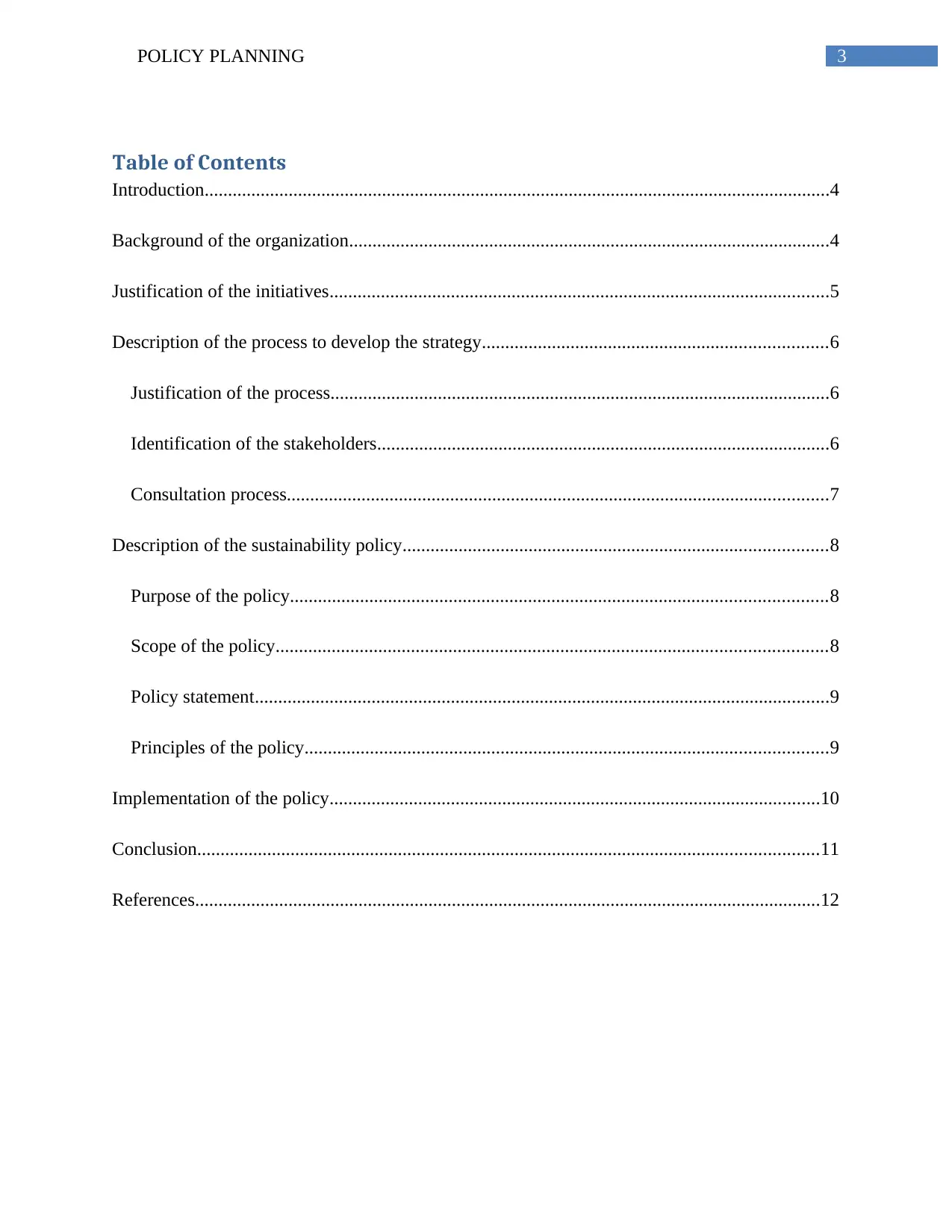
3POLICY PLANNING
Table of Contents
Introduction......................................................................................................................................4
Background of the organization.......................................................................................................4
Justification of the initiatives...........................................................................................................5
Description of the process to develop the strategy..........................................................................6
Justification of the process...........................................................................................................6
Identification of the stakeholders.................................................................................................6
Consultation process....................................................................................................................7
Description of the sustainability policy...........................................................................................8
Purpose of the policy...................................................................................................................8
Scope of the policy......................................................................................................................8
Policy statement...........................................................................................................................9
Principles of the policy................................................................................................................9
Implementation of the policy.........................................................................................................10
Conclusion.....................................................................................................................................11
References......................................................................................................................................12
Table of Contents
Introduction......................................................................................................................................4
Background of the organization.......................................................................................................4
Justification of the initiatives...........................................................................................................5
Description of the process to develop the strategy..........................................................................6
Justification of the process...........................................................................................................6
Identification of the stakeholders.................................................................................................6
Consultation process....................................................................................................................7
Description of the sustainability policy...........................................................................................8
Purpose of the policy...................................................................................................................8
Scope of the policy......................................................................................................................8
Policy statement...........................................................................................................................9
Principles of the policy................................................................................................................9
Implementation of the policy.........................................................................................................10
Conclusion.....................................................................................................................................11
References......................................................................................................................................12
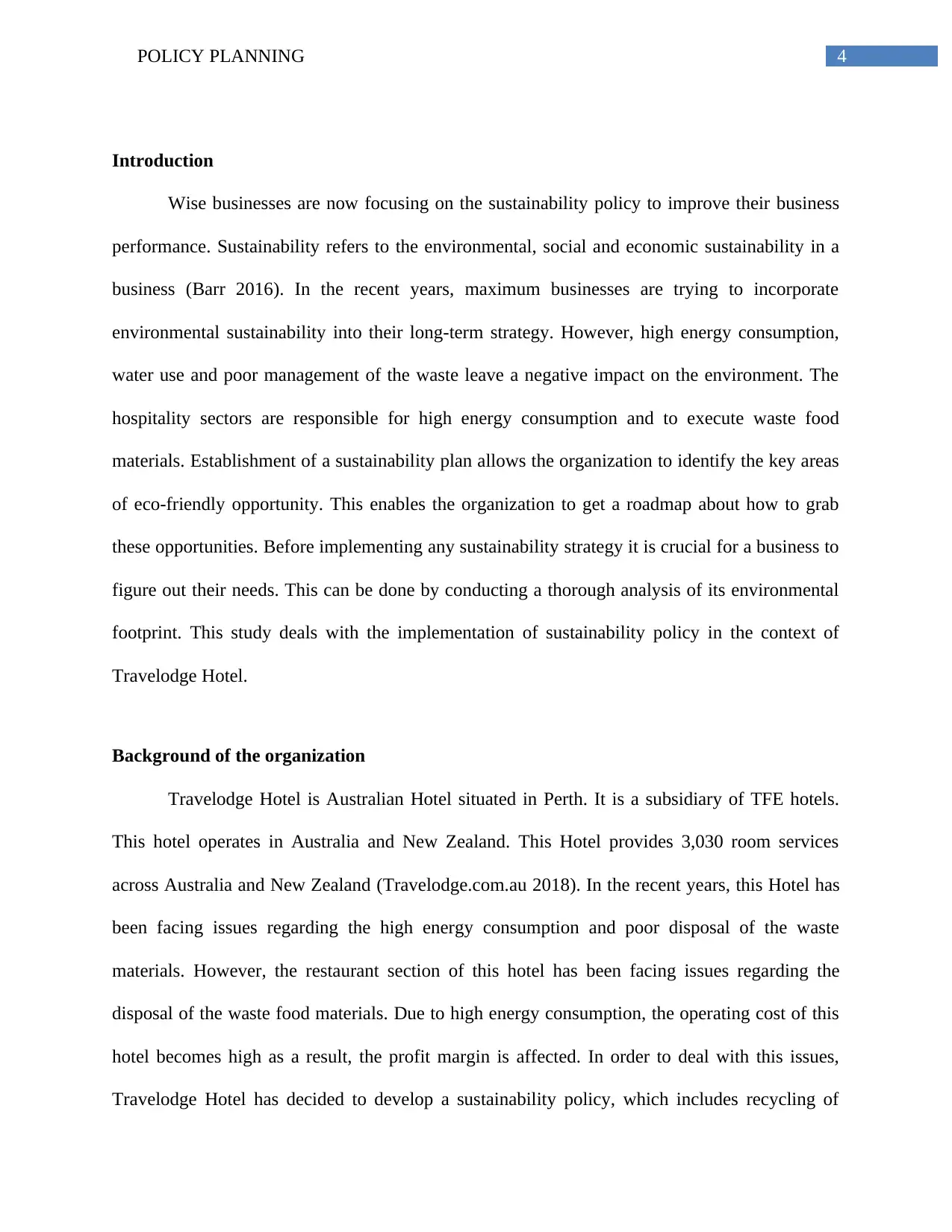
4POLICY PLANNING
Introduction
Wise businesses are now focusing on the sustainability policy to improve their business
performance. Sustainability refers to the environmental, social and economic sustainability in a
business (Barr 2016). In the recent years, maximum businesses are trying to incorporate
environmental sustainability into their long-term strategy. However, high energy consumption,
water use and poor management of the waste leave a negative impact on the environment. The
hospitality sectors are responsible for high energy consumption and to execute waste food
materials. Establishment of a sustainability plan allows the organization to identify the key areas
of eco-friendly opportunity. This enables the organization to get a roadmap about how to grab
these opportunities. Before implementing any sustainability strategy it is crucial for a business to
figure out their needs. This can be done by conducting a thorough analysis of its environmental
footprint. This study deals with the implementation of sustainability policy in the context of
Travelodge Hotel.
Background of the organization
Travelodge Hotel is Australian Hotel situated in Perth. It is a subsidiary of TFE hotels.
This hotel operates in Australia and New Zealand. This Hotel provides 3,030 room services
across Australia and New Zealand (Travelodge.com.au 2018). In the recent years, this Hotel has
been facing issues regarding the high energy consumption and poor disposal of the waste
materials. However, the restaurant section of this hotel has been facing issues regarding the
disposal of the waste food materials. Due to high energy consumption, the operating cost of this
hotel becomes high as a result, the profit margin is affected. In order to deal with this issues,
Travelodge Hotel has decided to develop a sustainability policy, which includes recycling of
Introduction
Wise businesses are now focusing on the sustainability policy to improve their business
performance. Sustainability refers to the environmental, social and economic sustainability in a
business (Barr 2016). In the recent years, maximum businesses are trying to incorporate
environmental sustainability into their long-term strategy. However, high energy consumption,
water use and poor management of the waste leave a negative impact on the environment. The
hospitality sectors are responsible for high energy consumption and to execute waste food
materials. Establishment of a sustainability plan allows the organization to identify the key areas
of eco-friendly opportunity. This enables the organization to get a roadmap about how to grab
these opportunities. Before implementing any sustainability strategy it is crucial for a business to
figure out their needs. This can be done by conducting a thorough analysis of its environmental
footprint. This study deals with the implementation of sustainability policy in the context of
Travelodge Hotel.
Background of the organization
Travelodge Hotel is Australian Hotel situated in Perth. It is a subsidiary of TFE hotels.
This hotel operates in Australia and New Zealand. This Hotel provides 3,030 room services
across Australia and New Zealand (Travelodge.com.au 2018). In the recent years, this Hotel has
been facing issues regarding the high energy consumption and poor disposal of the waste
materials. However, the restaurant section of this hotel has been facing issues regarding the
disposal of the waste food materials. Due to high energy consumption, the operating cost of this
hotel becomes high as a result, the profit margin is affected. In order to deal with this issues,
Travelodge Hotel has decided to develop a sustainability policy, which includes recycling of
Secure Best Marks with AI Grader
Need help grading? Try our AI Grader for instant feedback on your assignments.
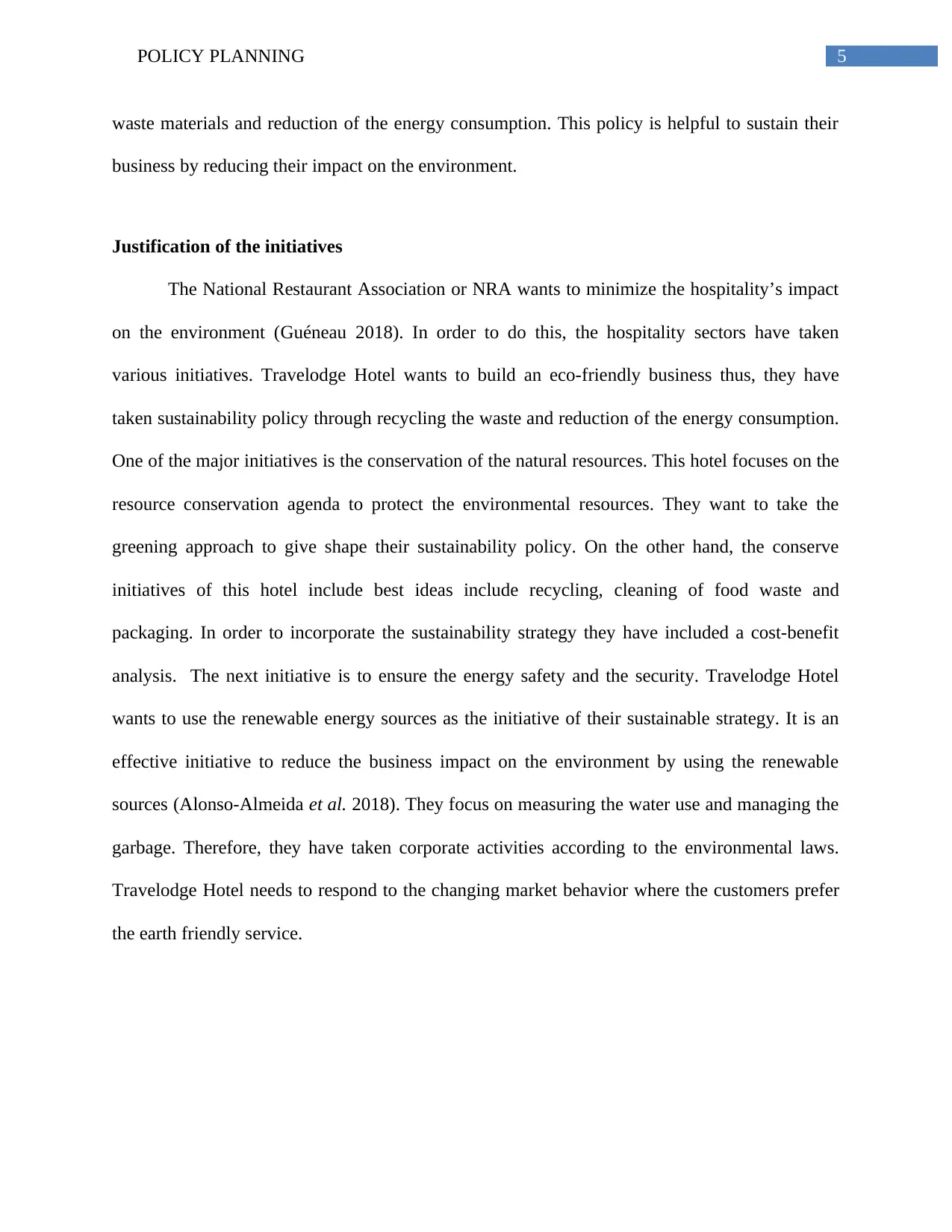
5POLICY PLANNING
waste materials and reduction of the energy consumption. This policy is helpful to sustain their
business by reducing their impact on the environment.
Justification of the initiatives
The National Restaurant Association or NRA wants to minimize the hospitality’s impact
on the environment (Guéneau 2018). In order to do this, the hospitality sectors have taken
various initiatives. Travelodge Hotel wants to build an eco-friendly business thus, they have
taken sustainability policy through recycling the waste and reduction of the energy consumption.
One of the major initiatives is the conservation of the natural resources. This hotel focuses on the
resource conservation agenda to protect the environmental resources. They want to take the
greening approach to give shape their sustainability policy. On the other hand, the conserve
initiatives of this hotel include best ideas include recycling, cleaning of food waste and
packaging. In order to incorporate the sustainability strategy they have included a cost-benefit
analysis. The next initiative is to ensure the energy safety and the security. Travelodge Hotel
wants to use the renewable energy sources as the initiative of their sustainable strategy. It is an
effective initiative to reduce the business impact on the environment by using the renewable
sources (Alonso-Almeida et al. 2018). They focus on measuring the water use and managing the
garbage. Therefore, they have taken corporate activities according to the environmental laws.
Travelodge Hotel needs to respond to the changing market behavior where the customers prefer
the earth friendly service.
waste materials and reduction of the energy consumption. This policy is helpful to sustain their
business by reducing their impact on the environment.
Justification of the initiatives
The National Restaurant Association or NRA wants to minimize the hospitality’s impact
on the environment (Guéneau 2018). In order to do this, the hospitality sectors have taken
various initiatives. Travelodge Hotel wants to build an eco-friendly business thus, they have
taken sustainability policy through recycling the waste and reduction of the energy consumption.
One of the major initiatives is the conservation of the natural resources. This hotel focuses on the
resource conservation agenda to protect the environmental resources. They want to take the
greening approach to give shape their sustainability policy. On the other hand, the conserve
initiatives of this hotel include best ideas include recycling, cleaning of food waste and
packaging. In order to incorporate the sustainability strategy they have included a cost-benefit
analysis. The next initiative is to ensure the energy safety and the security. Travelodge Hotel
wants to use the renewable energy sources as the initiative of their sustainable strategy. It is an
effective initiative to reduce the business impact on the environment by using the renewable
sources (Alonso-Almeida et al. 2018). They focus on measuring the water use and managing the
garbage. Therefore, they have taken corporate activities according to the environmental laws.
Travelodge Hotel needs to respond to the changing market behavior where the customers prefer
the earth friendly service.
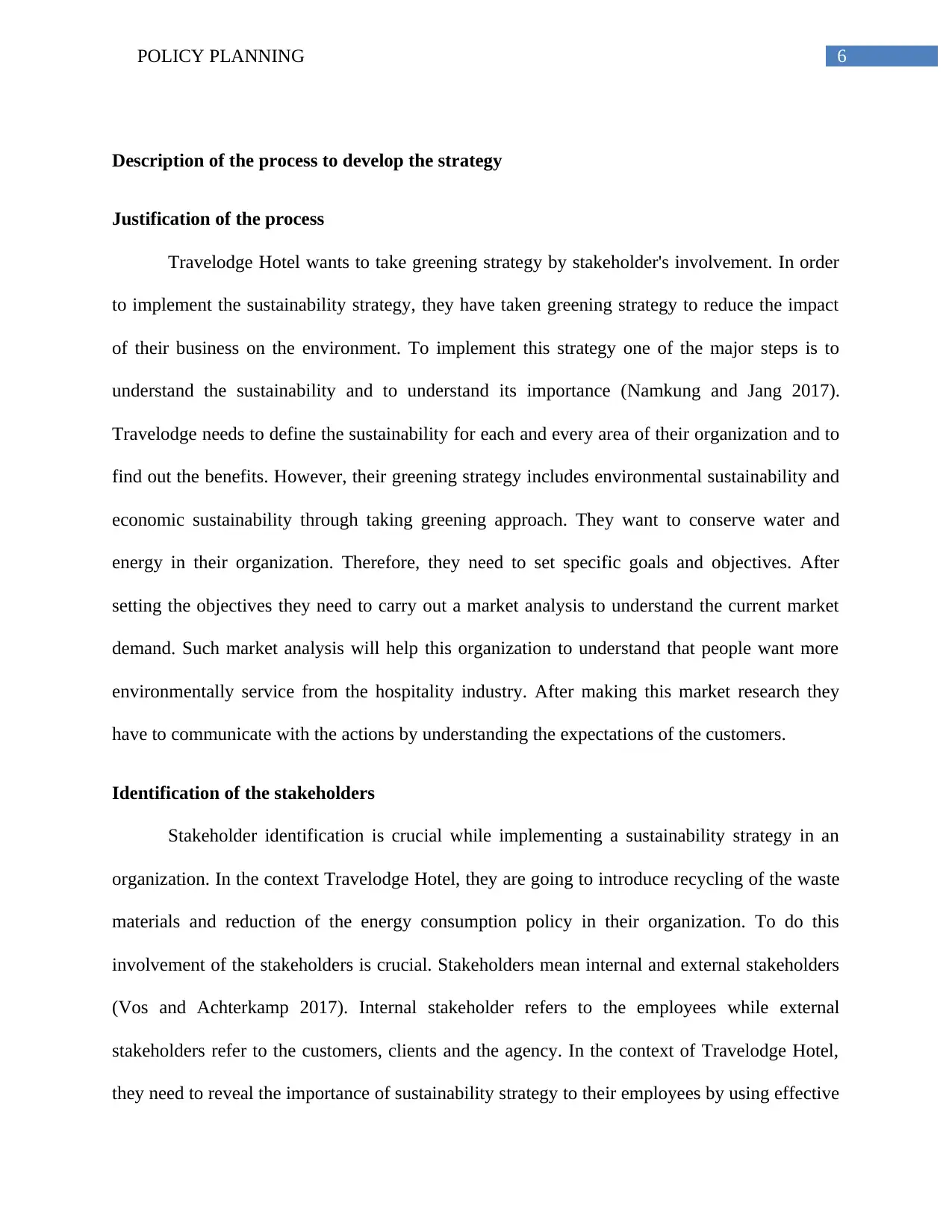
6POLICY PLANNING
Description of the process to develop the strategy
Justification of the process
Travelodge Hotel wants to take greening strategy by stakeholder's involvement. In order
to implement the sustainability strategy, they have taken greening strategy to reduce the impact
of their business on the environment. To implement this strategy one of the major steps is to
understand the sustainability and to understand its importance (Namkung and Jang 2017).
Travelodge needs to define the sustainability for each and every area of their organization and to
find out the benefits. However, their greening strategy includes environmental sustainability and
economic sustainability through taking greening approach. They want to conserve water and
energy in their organization. Therefore, they need to set specific goals and objectives. After
setting the objectives they need to carry out a market analysis to understand the current market
demand. Such market analysis will help this organization to understand that people want more
environmentally service from the hospitality industry. After making this market research they
have to communicate with the actions by understanding the expectations of the customers.
Identification of the stakeholders
Stakeholder identification is crucial while implementing a sustainability strategy in an
organization. In the context Travelodge Hotel, they are going to introduce recycling of the waste
materials and reduction of the energy consumption policy in their organization. To do this
involvement of the stakeholders is crucial. Stakeholders mean internal and external stakeholders
(Vos and Achterkamp 2017). Internal stakeholder refers to the employees while external
stakeholders refer to the customers, clients and the agency. In the context of Travelodge Hotel,
they need to reveal the importance of sustainability strategy to their employees by using effective
Description of the process to develop the strategy
Justification of the process
Travelodge Hotel wants to take greening strategy by stakeholder's involvement. In order
to implement the sustainability strategy, they have taken greening strategy to reduce the impact
of their business on the environment. To implement this strategy one of the major steps is to
understand the sustainability and to understand its importance (Namkung and Jang 2017).
Travelodge needs to define the sustainability for each and every area of their organization and to
find out the benefits. However, their greening strategy includes environmental sustainability and
economic sustainability through taking greening approach. They want to conserve water and
energy in their organization. Therefore, they need to set specific goals and objectives. After
setting the objectives they need to carry out a market analysis to understand the current market
demand. Such market analysis will help this organization to understand that people want more
environmentally service from the hospitality industry. After making this market research they
have to communicate with the actions by understanding the expectations of the customers.
Identification of the stakeholders
Stakeholder identification is crucial while implementing a sustainability strategy in an
organization. In the context Travelodge Hotel, they are going to introduce recycling of the waste
materials and reduction of the energy consumption policy in their organization. To do this
involvement of the stakeholders is crucial. Stakeholders mean internal and external stakeholders
(Vos and Achterkamp 2017). Internal stakeholder refers to the employees while external
stakeholders refer to the customers, clients and the agency. In the context of Travelodge Hotel,
they need to reveal the importance of sustainability strategy to their employees by using effective
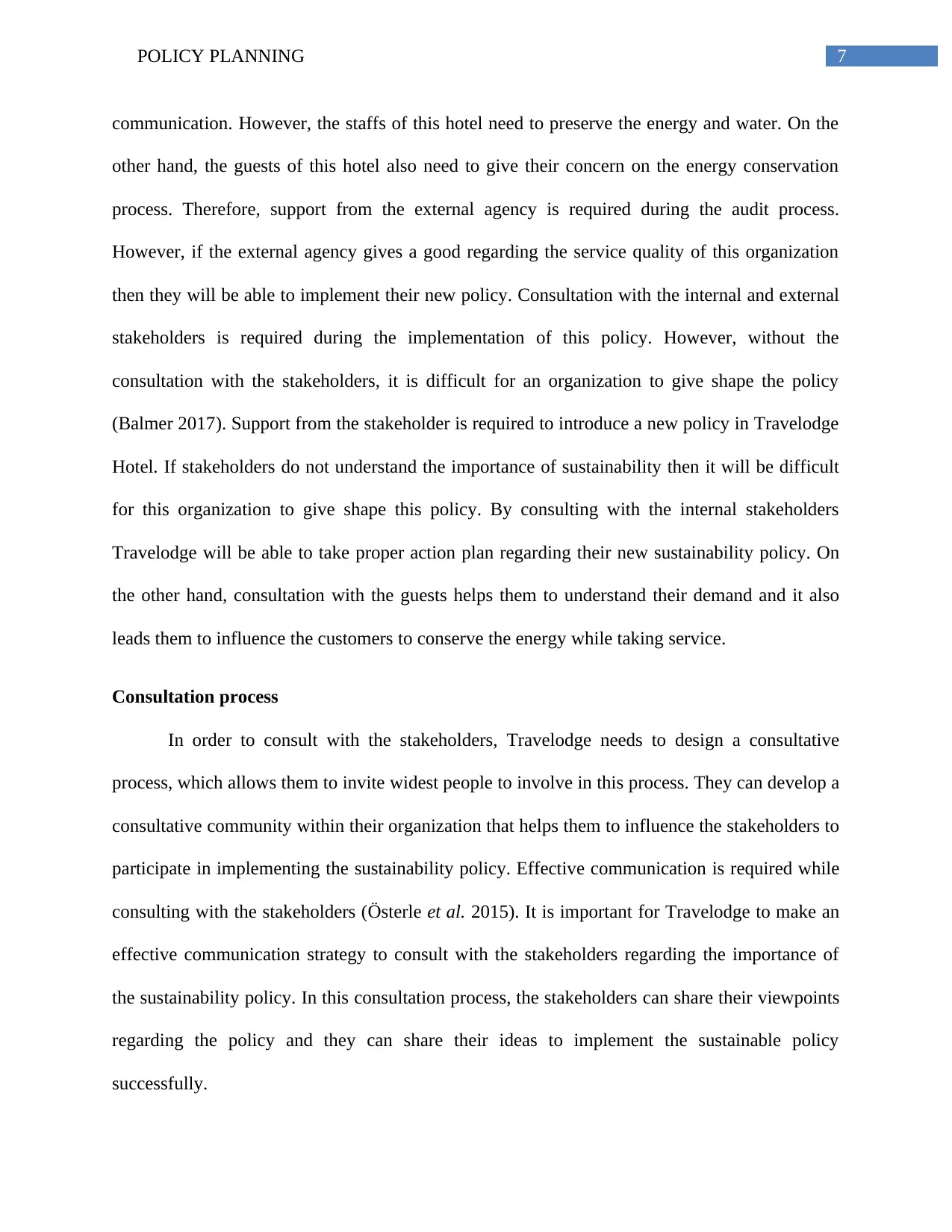
7POLICY PLANNING
communication. However, the staffs of this hotel need to preserve the energy and water. On the
other hand, the guests of this hotel also need to give their concern on the energy conservation
process. Therefore, support from the external agency is required during the audit process.
However, if the external agency gives a good regarding the service quality of this organization
then they will be able to implement their new policy. Consultation with the internal and external
stakeholders is required during the implementation of this policy. However, without the
consultation with the stakeholders, it is difficult for an organization to give shape the policy
(Balmer 2017). Support from the stakeholder is required to introduce a new policy in Travelodge
Hotel. If stakeholders do not understand the importance of sustainability then it will be difficult
for this organization to give shape this policy. By consulting with the internal stakeholders
Travelodge will be able to take proper action plan regarding their new sustainability policy. On
the other hand, consultation with the guests helps them to understand their demand and it also
leads them to influence the customers to conserve the energy while taking service.
Consultation process
In order to consult with the stakeholders, Travelodge needs to design a consultative
process, which allows them to invite widest people to involve in this process. They can develop a
consultative community within their organization that helps them to influence the stakeholders to
participate in implementing the sustainability policy. Effective communication is required while
consulting with the stakeholders (Österle et al. 2015). It is important for Travelodge to make an
effective communication strategy to consult with the stakeholders regarding the importance of
the sustainability policy. In this consultation process, the stakeholders can share their viewpoints
regarding the policy and they can share their ideas to implement the sustainable policy
successfully.
communication. However, the staffs of this hotel need to preserve the energy and water. On the
other hand, the guests of this hotel also need to give their concern on the energy conservation
process. Therefore, support from the external agency is required during the audit process.
However, if the external agency gives a good regarding the service quality of this organization
then they will be able to implement their new policy. Consultation with the internal and external
stakeholders is required during the implementation of this policy. However, without the
consultation with the stakeholders, it is difficult for an organization to give shape the policy
(Balmer 2017). Support from the stakeholder is required to introduce a new policy in Travelodge
Hotel. If stakeholders do not understand the importance of sustainability then it will be difficult
for this organization to give shape this policy. By consulting with the internal stakeholders
Travelodge will be able to take proper action plan regarding their new sustainability policy. On
the other hand, consultation with the guests helps them to understand their demand and it also
leads them to influence the customers to conserve the energy while taking service.
Consultation process
In order to consult with the stakeholders, Travelodge needs to design a consultative
process, which allows them to invite widest people to involve in this process. They can develop a
consultative community within their organization that helps them to influence the stakeholders to
participate in implementing the sustainability policy. Effective communication is required while
consulting with the stakeholders (Österle et al. 2015). It is important for Travelodge to make an
effective communication strategy to consult with the stakeholders regarding the importance of
the sustainability policy. In this consultation process, the stakeholders can share their viewpoints
regarding the policy and they can share their ideas to implement the sustainable policy
successfully.
Paraphrase This Document
Need a fresh take? Get an instant paraphrase of this document with our AI Paraphraser
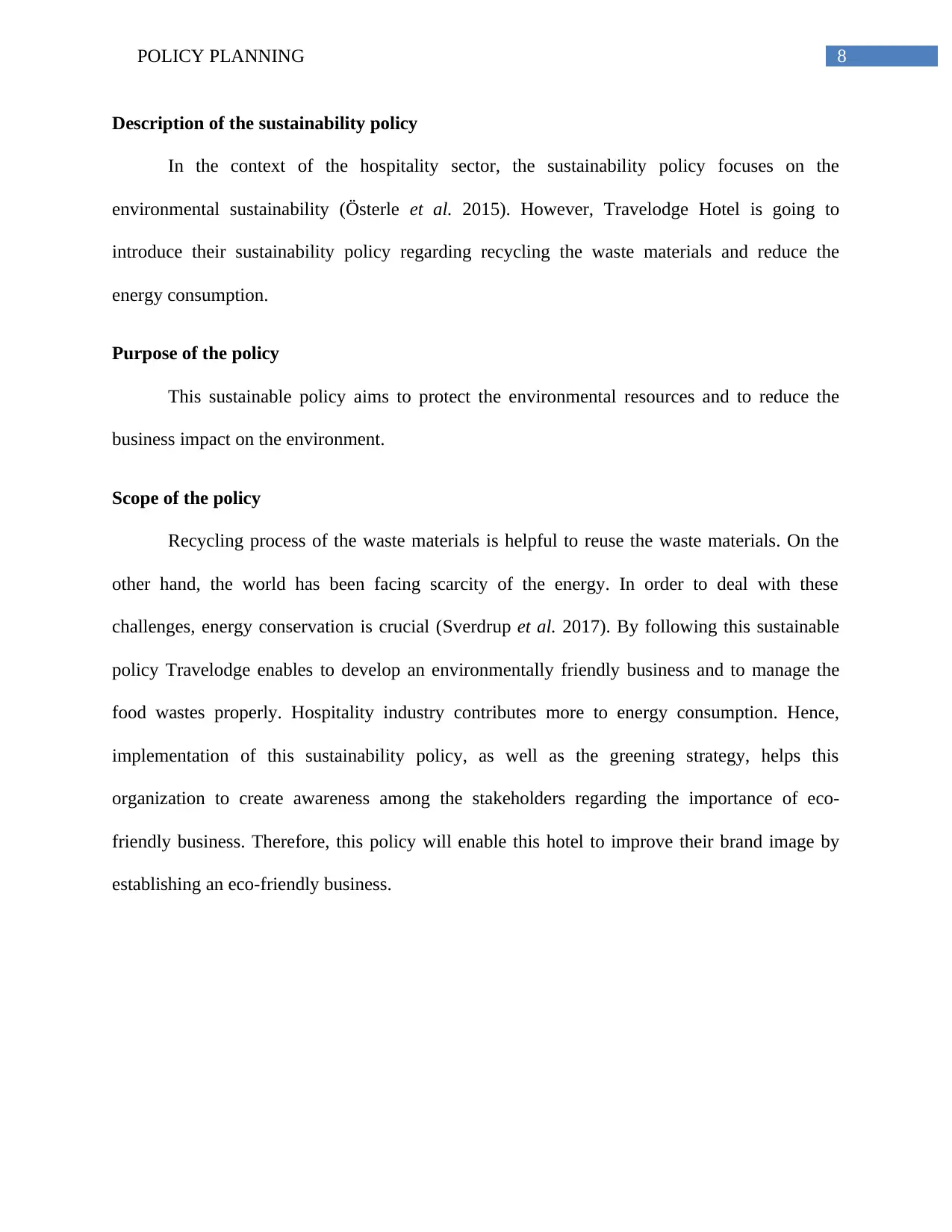
8POLICY PLANNING
Description of the sustainability policy
In the context of the hospitality sector, the sustainability policy focuses on the
environmental sustainability (Österle et al. 2015). However, Travelodge Hotel is going to
introduce their sustainability policy regarding recycling the waste materials and reduce the
energy consumption.
Purpose of the policy
This sustainable policy aims to protect the environmental resources and to reduce the
business impact on the environment.
Scope of the policy
Recycling process of the waste materials is helpful to reuse the waste materials. On the
other hand, the world has been facing scarcity of the energy. In order to deal with these
challenges, energy conservation is crucial (Sverdrup et al. 2017). By following this sustainable
policy Travelodge enables to develop an environmentally friendly business and to manage the
food wastes properly. Hospitality industry contributes more to energy consumption. Hence,
implementation of this sustainability policy, as well as the greening strategy, helps this
organization to create awareness among the stakeholders regarding the importance of eco-
friendly business. Therefore, this policy will enable this hotel to improve their brand image by
establishing an eco-friendly business.
Description of the sustainability policy
In the context of the hospitality sector, the sustainability policy focuses on the
environmental sustainability (Österle et al. 2015). However, Travelodge Hotel is going to
introduce their sustainability policy regarding recycling the waste materials and reduce the
energy consumption.
Purpose of the policy
This sustainable policy aims to protect the environmental resources and to reduce the
business impact on the environment.
Scope of the policy
Recycling process of the waste materials is helpful to reuse the waste materials. On the
other hand, the world has been facing scarcity of the energy. In order to deal with these
challenges, energy conservation is crucial (Sverdrup et al. 2017). By following this sustainable
policy Travelodge enables to develop an environmentally friendly business and to manage the
food wastes properly. Hospitality industry contributes more to energy consumption. Hence,
implementation of this sustainability policy, as well as the greening strategy, helps this
organization to create awareness among the stakeholders regarding the importance of eco-
friendly business. Therefore, this policy will enable this hotel to improve their brand image by
establishing an eco-friendly business.
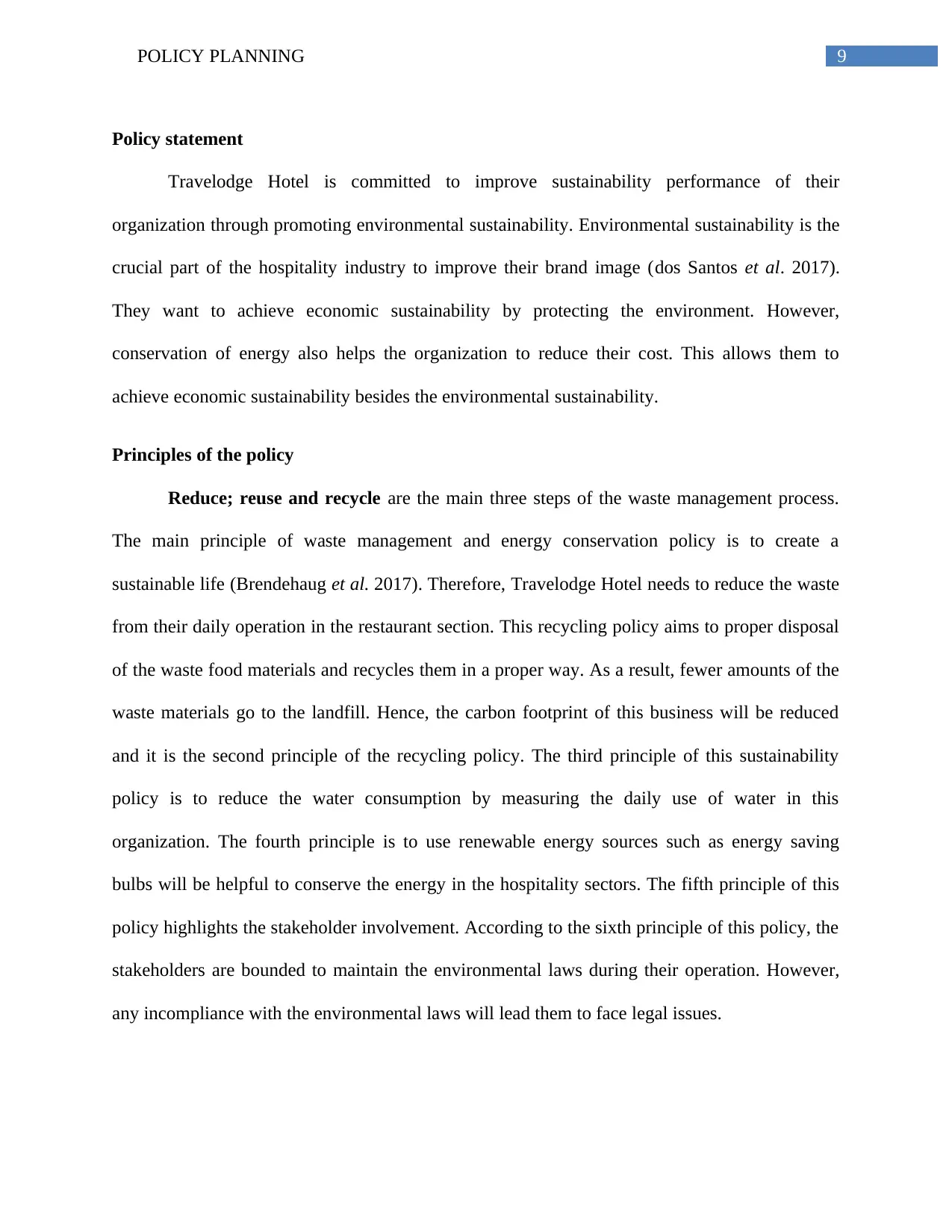
9POLICY PLANNING
Policy statement
Travelodge Hotel is committed to improve sustainability performance of their
organization through promoting environmental sustainability. Environmental sustainability is the
crucial part of the hospitality industry to improve their brand image (dos Santos et al. 2017).
They want to achieve economic sustainability by protecting the environment. However,
conservation of energy also helps the organization to reduce their cost. This allows them to
achieve economic sustainability besides the environmental sustainability.
Principles of the policy
Reduce; reuse and recycle are the main three steps of the waste management process.
The main principle of waste management and energy conservation policy is to create a
sustainable life (Brendehaug et al. 2017). Therefore, Travelodge Hotel needs to reduce the waste
from their daily operation in the restaurant section. This recycling policy aims to proper disposal
of the waste food materials and recycles them in a proper way. As a result, fewer amounts of the
waste materials go to the landfill. Hence, the carbon footprint of this business will be reduced
and it is the second principle of the recycling policy. The third principle of this sustainability
policy is to reduce the water consumption by measuring the daily use of water in this
organization. The fourth principle is to use renewable energy sources such as energy saving
bulbs will be helpful to conserve the energy in the hospitality sectors. The fifth principle of this
policy highlights the stakeholder involvement. According to the sixth principle of this policy, the
stakeholders are bounded to maintain the environmental laws during their operation. However,
any incompliance with the environmental laws will lead them to face legal issues.
Policy statement
Travelodge Hotel is committed to improve sustainability performance of their
organization through promoting environmental sustainability. Environmental sustainability is the
crucial part of the hospitality industry to improve their brand image (dos Santos et al. 2017).
They want to achieve economic sustainability by protecting the environment. However,
conservation of energy also helps the organization to reduce their cost. This allows them to
achieve economic sustainability besides the environmental sustainability.
Principles of the policy
Reduce; reuse and recycle are the main three steps of the waste management process.
The main principle of waste management and energy conservation policy is to create a
sustainable life (Brendehaug et al. 2017). Therefore, Travelodge Hotel needs to reduce the waste
from their daily operation in the restaurant section. This recycling policy aims to proper disposal
of the waste food materials and recycles them in a proper way. As a result, fewer amounts of the
waste materials go to the landfill. Hence, the carbon footprint of this business will be reduced
and it is the second principle of the recycling policy. The third principle of this sustainability
policy is to reduce the water consumption by measuring the daily use of water in this
organization. The fourth principle is to use renewable energy sources such as energy saving
bulbs will be helpful to conserve the energy in the hospitality sectors. The fifth principle of this
policy highlights the stakeholder involvement. According to the sixth principle of this policy, the
stakeholders are bounded to maintain the environmental laws during their operation. However,
any incompliance with the environmental laws will lead them to face legal issues.
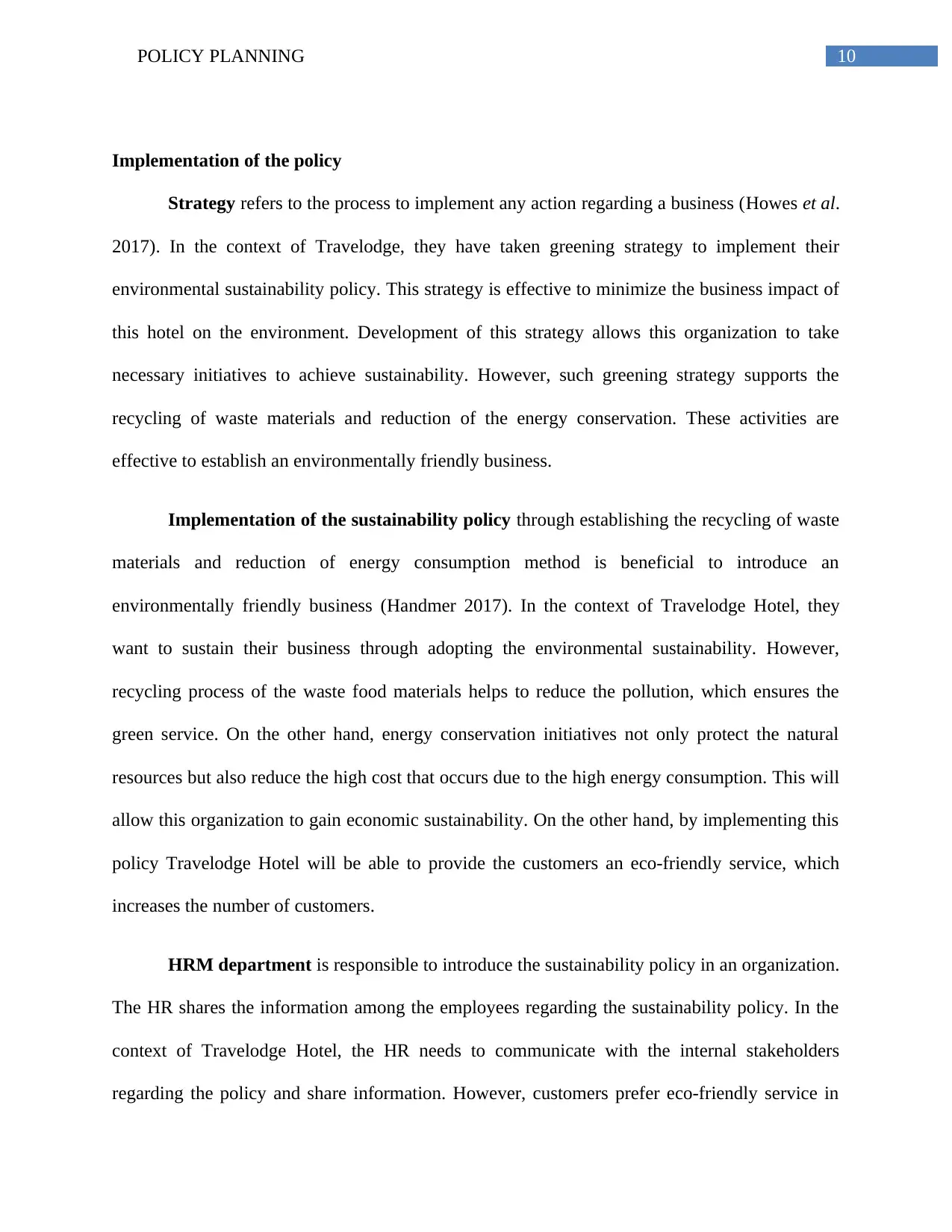
10POLICY PLANNING
Implementation of the policy
Strategy refers to the process to implement any action regarding a business (Howes et al.
2017). In the context of Travelodge, they have taken greening strategy to implement their
environmental sustainability policy. This strategy is effective to minimize the business impact of
this hotel on the environment. Development of this strategy allows this organization to take
necessary initiatives to achieve sustainability. However, such greening strategy supports the
recycling of waste materials and reduction of the energy conservation. These activities are
effective to establish an environmentally friendly business.
Implementation of the sustainability policy through establishing the recycling of waste
materials and reduction of energy consumption method is beneficial to introduce an
environmentally friendly business (Handmer 2017). In the context of Travelodge Hotel, they
want to sustain their business through adopting the environmental sustainability. However,
recycling process of the waste food materials helps to reduce the pollution, which ensures the
green service. On the other hand, energy conservation initiatives not only protect the natural
resources but also reduce the high cost that occurs due to the high energy consumption. This will
allow this organization to gain economic sustainability. On the other hand, by implementing this
policy Travelodge Hotel will be able to provide the customers an eco-friendly service, which
increases the number of customers.
HRM department is responsible to introduce the sustainability policy in an organization.
The HR shares the information among the employees regarding the sustainability policy. In the
context of Travelodge Hotel, the HR needs to communicate with the internal stakeholders
regarding the policy and share information. However, customers prefer eco-friendly service in
Implementation of the policy
Strategy refers to the process to implement any action regarding a business (Howes et al.
2017). In the context of Travelodge, they have taken greening strategy to implement their
environmental sustainability policy. This strategy is effective to minimize the business impact of
this hotel on the environment. Development of this strategy allows this organization to take
necessary initiatives to achieve sustainability. However, such greening strategy supports the
recycling of waste materials and reduction of the energy conservation. These activities are
effective to establish an environmentally friendly business.
Implementation of the sustainability policy through establishing the recycling of waste
materials and reduction of energy consumption method is beneficial to introduce an
environmentally friendly business (Handmer 2017). In the context of Travelodge Hotel, they
want to sustain their business through adopting the environmental sustainability. However,
recycling process of the waste food materials helps to reduce the pollution, which ensures the
green service. On the other hand, energy conservation initiatives not only protect the natural
resources but also reduce the high cost that occurs due to the high energy consumption. This will
allow this organization to gain economic sustainability. On the other hand, by implementing this
policy Travelodge Hotel will be able to provide the customers an eco-friendly service, which
increases the number of customers.
HRM department is responsible to introduce the sustainability policy in an organization.
The HR shares the information among the employees regarding the sustainability policy. In the
context of Travelodge Hotel, the HR needs to communicate with the internal stakeholders
regarding the policy and share information. However, customers prefer eco-friendly service in
Secure Best Marks with AI Grader
Need help grading? Try our AI Grader for instant feedback on your assignments.
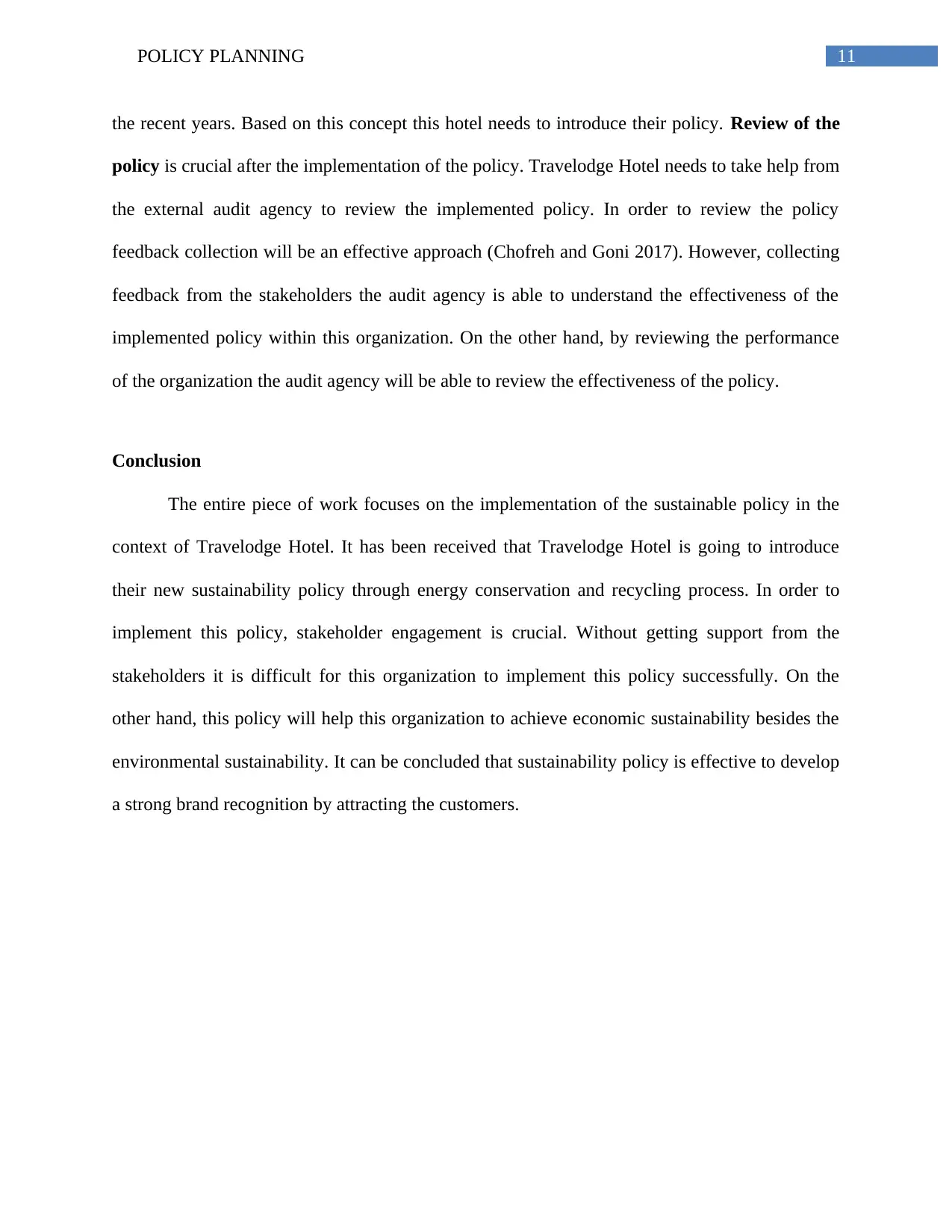
11POLICY PLANNING
the recent years. Based on this concept this hotel needs to introduce their policy. Review of the
policy is crucial after the implementation of the policy. Travelodge Hotel needs to take help from
the external audit agency to review the implemented policy. In order to review the policy
feedback collection will be an effective approach (Chofreh and Goni 2017). However, collecting
feedback from the stakeholders the audit agency is able to understand the effectiveness of the
implemented policy within this organization. On the other hand, by reviewing the performance
of the organization the audit agency will be able to review the effectiveness of the policy.
Conclusion
The entire piece of work focuses on the implementation of the sustainable policy in the
context of Travelodge Hotel. It has been received that Travelodge Hotel is going to introduce
their new sustainability policy through energy conservation and recycling process. In order to
implement this policy, stakeholder engagement is crucial. Without getting support from the
stakeholders it is difficult for this organization to implement this policy successfully. On the
other hand, this policy will help this organization to achieve economic sustainability besides the
environmental sustainability. It can be concluded that sustainability policy is effective to develop
a strong brand recognition by attracting the customers.
the recent years. Based on this concept this hotel needs to introduce their policy. Review of the
policy is crucial after the implementation of the policy. Travelodge Hotel needs to take help from
the external audit agency to review the implemented policy. In order to review the policy
feedback collection will be an effective approach (Chofreh and Goni 2017). However, collecting
feedback from the stakeholders the audit agency is able to understand the effectiveness of the
implemented policy within this organization. On the other hand, by reviewing the performance
of the organization the audit agency will be able to review the effectiveness of the policy.
Conclusion
The entire piece of work focuses on the implementation of the sustainable policy in the
context of Travelodge Hotel. It has been received that Travelodge Hotel is going to introduce
their new sustainability policy through energy conservation and recycling process. In order to
implement this policy, stakeholder engagement is crucial. Without getting support from the
stakeholders it is difficult for this organization to implement this policy successfully. On the
other hand, this policy will help this organization to achieve economic sustainability besides the
environmental sustainability. It can be concluded that sustainability policy is effective to develop
a strong brand recognition by attracting the customers.
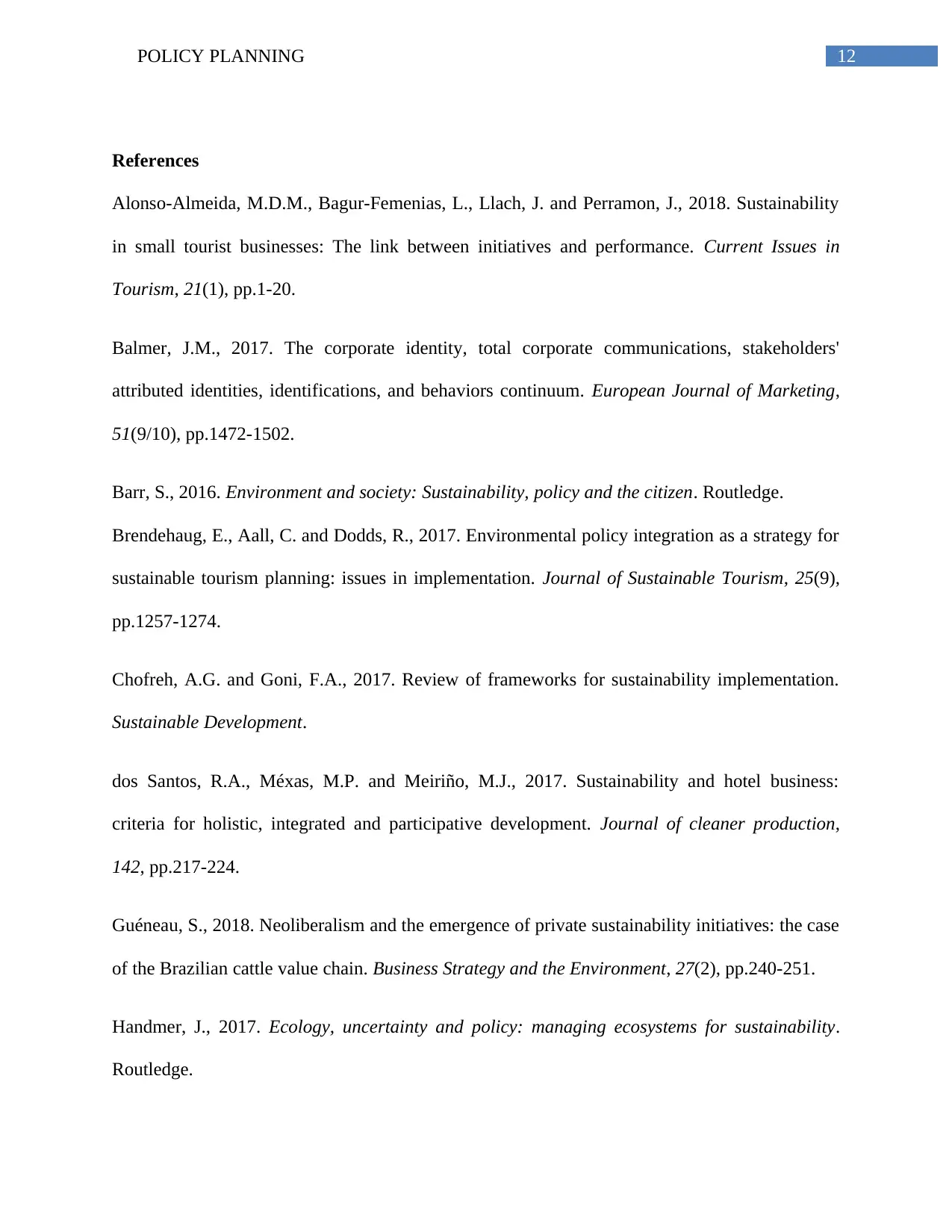
12POLICY PLANNING
References
Alonso-Almeida, M.D.M., Bagur-Femenias, L., Llach, J. and Perramon, J., 2018. Sustainability
in small tourist businesses: The link between initiatives and performance. Current Issues in
Tourism, 21(1), pp.1-20.
Balmer, J.M., 2017. The corporate identity, total corporate communications, stakeholders'
attributed identities, identifications, and behaviors continuum. European Journal of Marketing,
51(9/10), pp.1472-1502.
Barr, S., 2016. Environment and society: Sustainability, policy and the citizen. Routledge.
Brendehaug, E., Aall, C. and Dodds, R., 2017. Environmental policy integration as a strategy for
sustainable tourism planning: issues in implementation. Journal of Sustainable Tourism, 25(9),
pp.1257-1274.
Chofreh, A.G. and Goni, F.A., 2017. Review of frameworks for sustainability implementation.
Sustainable Development.
dos Santos, R.A., Méxas, M.P. and Meiriño, M.J., 2017. Sustainability and hotel business:
criteria for holistic, integrated and participative development. Journal of cleaner production,
142, pp.217-224.
Guéneau, S., 2018. Neoliberalism and the emergence of private sustainability initiatives: the case
of the Brazilian cattle value chain. Business Strategy and the Environment, 27(2), pp.240-251.
Handmer, J., 2017. Ecology, uncertainty and policy: managing ecosystems for sustainability.
Routledge.
References
Alonso-Almeida, M.D.M., Bagur-Femenias, L., Llach, J. and Perramon, J., 2018. Sustainability
in small tourist businesses: The link between initiatives and performance. Current Issues in
Tourism, 21(1), pp.1-20.
Balmer, J.M., 2017. The corporate identity, total corporate communications, stakeholders'
attributed identities, identifications, and behaviors continuum. European Journal of Marketing,
51(9/10), pp.1472-1502.
Barr, S., 2016. Environment and society: Sustainability, policy and the citizen. Routledge.
Brendehaug, E., Aall, C. and Dodds, R., 2017. Environmental policy integration as a strategy for
sustainable tourism planning: issues in implementation. Journal of Sustainable Tourism, 25(9),
pp.1257-1274.
Chofreh, A.G. and Goni, F.A., 2017. Review of frameworks for sustainability implementation.
Sustainable Development.
dos Santos, R.A., Méxas, M.P. and Meiriño, M.J., 2017. Sustainability and hotel business:
criteria for holistic, integrated and participative development. Journal of cleaner production,
142, pp.217-224.
Guéneau, S., 2018. Neoliberalism and the emergence of private sustainability initiatives: the case
of the Brazilian cattle value chain. Business Strategy and the Environment, 27(2), pp.240-251.
Handmer, J., 2017. Ecology, uncertainty and policy: managing ecosystems for sustainability.
Routledge.
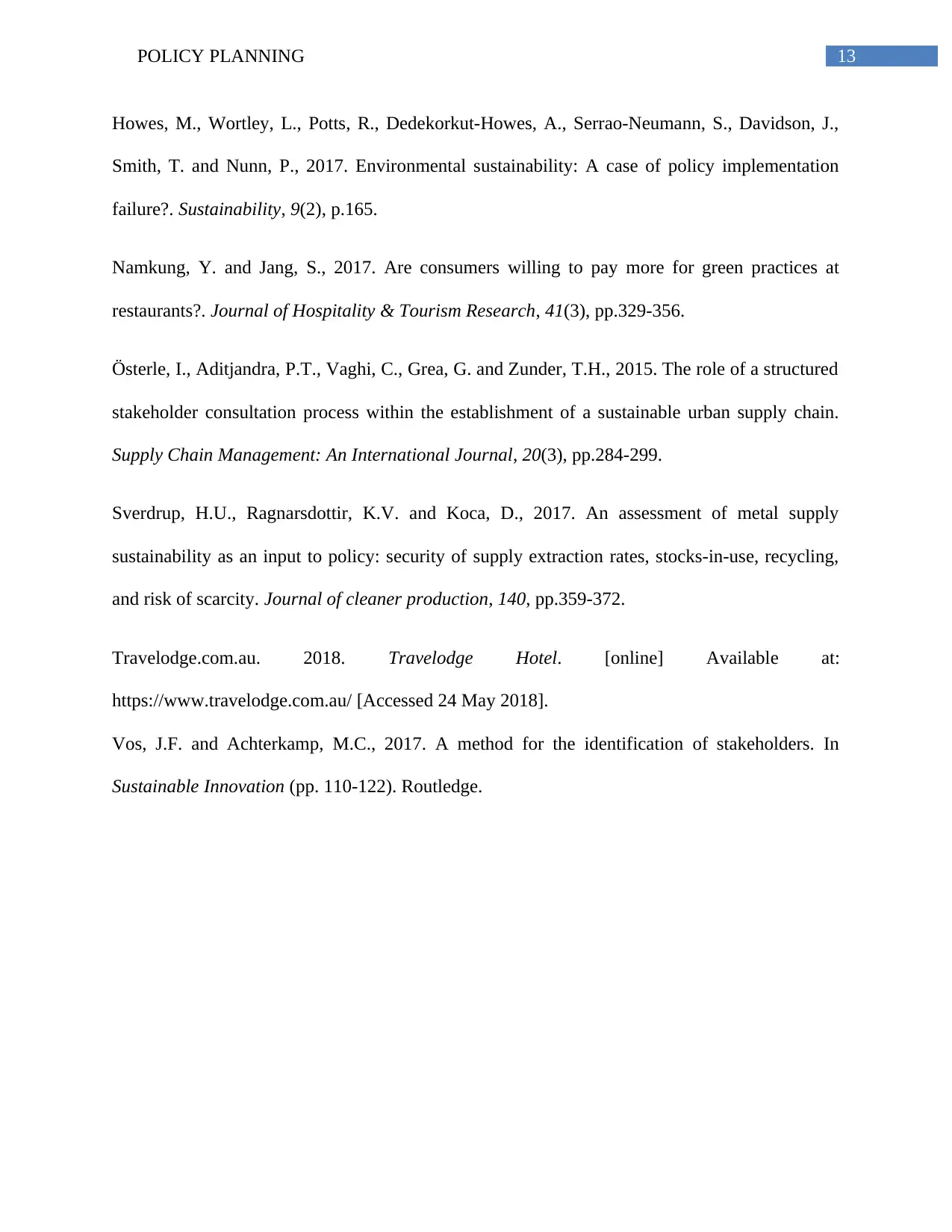
13POLICY PLANNING
Howes, M., Wortley, L., Potts, R., Dedekorkut-Howes, A., Serrao-Neumann, S., Davidson, J.,
Smith, T. and Nunn, P., 2017. Environmental sustainability: A case of policy implementation
failure?. Sustainability, 9(2), p.165.
Namkung, Y. and Jang, S., 2017. Are consumers willing to pay more for green practices at
restaurants?. Journal of Hospitality & Tourism Research, 41(3), pp.329-356.
Österle, I., Aditjandra, P.T., Vaghi, C., Grea, G. and Zunder, T.H., 2015. The role of a structured
stakeholder consultation process within the establishment of a sustainable urban supply chain.
Supply Chain Management: An International Journal, 20(3), pp.284-299.
Sverdrup, H.U., Ragnarsdottir, K.V. and Koca, D., 2017. An assessment of metal supply
sustainability as an input to policy: security of supply extraction rates, stocks-in-use, recycling,
and risk of scarcity. Journal of cleaner production, 140, pp.359-372.
Travelodge.com.au. 2018. Travelodge Hotel. [online] Available at:
https://www.travelodge.com.au/ [Accessed 24 May 2018].
Vos, J.F. and Achterkamp, M.C., 2017. A method for the identification of stakeholders. In
Sustainable Innovation (pp. 110-122). Routledge.
Howes, M., Wortley, L., Potts, R., Dedekorkut-Howes, A., Serrao-Neumann, S., Davidson, J.,
Smith, T. and Nunn, P., 2017. Environmental sustainability: A case of policy implementation
failure?. Sustainability, 9(2), p.165.
Namkung, Y. and Jang, S., 2017. Are consumers willing to pay more for green practices at
restaurants?. Journal of Hospitality & Tourism Research, 41(3), pp.329-356.
Österle, I., Aditjandra, P.T., Vaghi, C., Grea, G. and Zunder, T.H., 2015. The role of a structured
stakeholder consultation process within the establishment of a sustainable urban supply chain.
Supply Chain Management: An International Journal, 20(3), pp.284-299.
Sverdrup, H.U., Ragnarsdottir, K.V. and Koca, D., 2017. An assessment of metal supply
sustainability as an input to policy: security of supply extraction rates, stocks-in-use, recycling,
and risk of scarcity. Journal of cleaner production, 140, pp.359-372.
Travelodge.com.au. 2018. Travelodge Hotel. [online] Available at:
https://www.travelodge.com.au/ [Accessed 24 May 2018].
Vos, J.F. and Achterkamp, M.C., 2017. A method for the identification of stakeholders. In
Sustainable Innovation (pp. 110-122). Routledge.
Paraphrase This Document
Need a fresh take? Get an instant paraphrase of this document with our AI Paraphraser

14POLICY PLANNING
1 out of 14
Related Documents
Your All-in-One AI-Powered Toolkit for Academic Success.
+13062052269
info@desklib.com
Available 24*7 on WhatsApp / Email
![[object Object]](/_next/static/media/star-bottom.7253800d.svg)
Unlock your academic potential
© 2024 | Zucol Services PVT LTD | All rights reserved.





